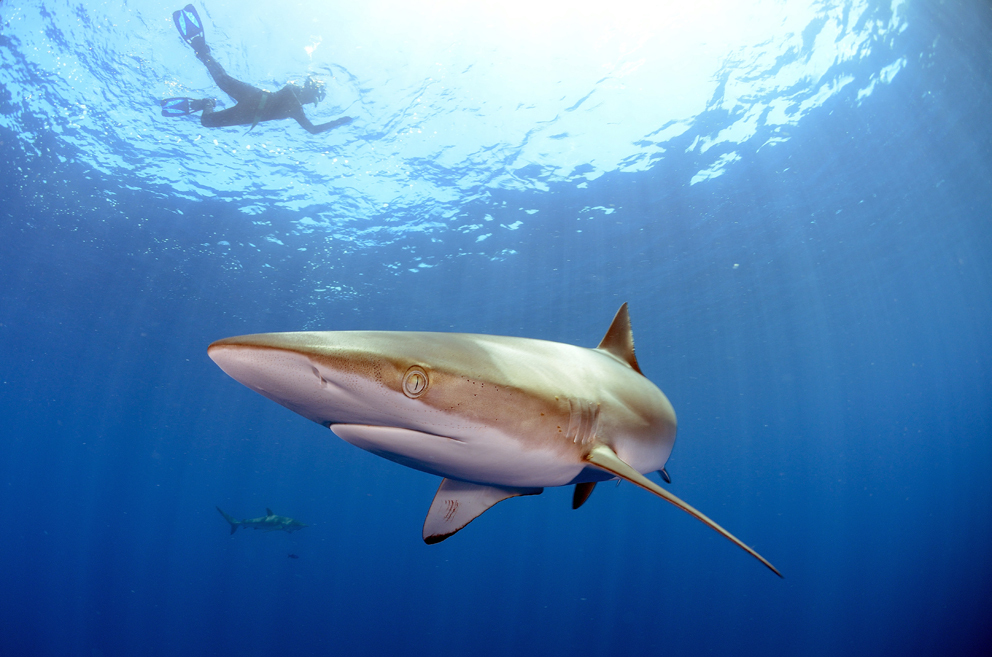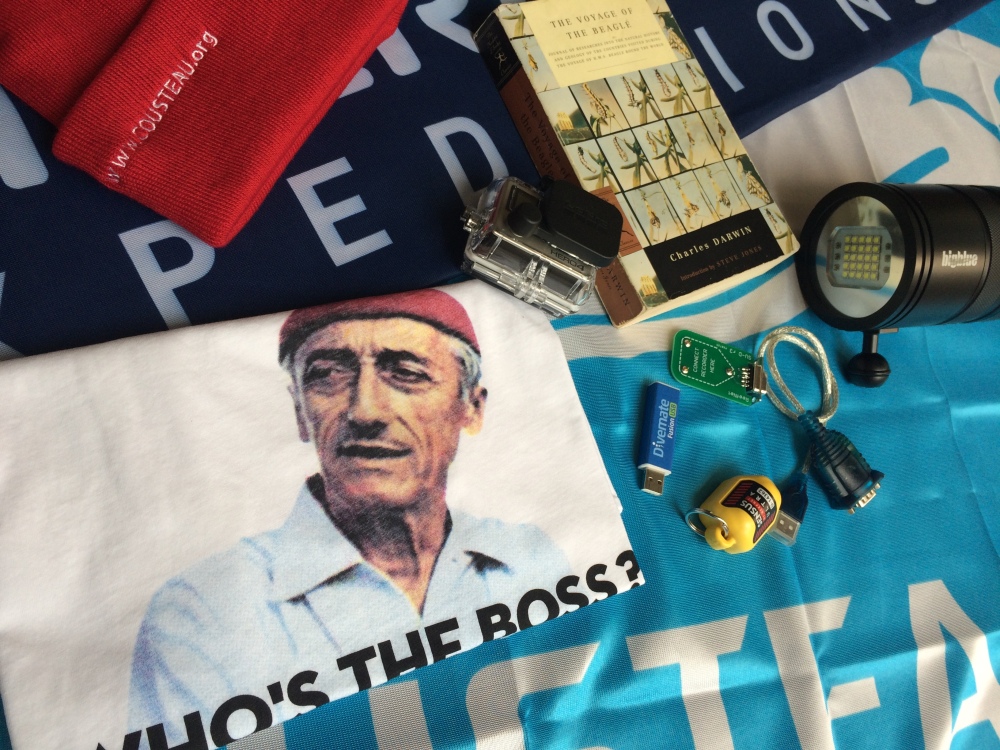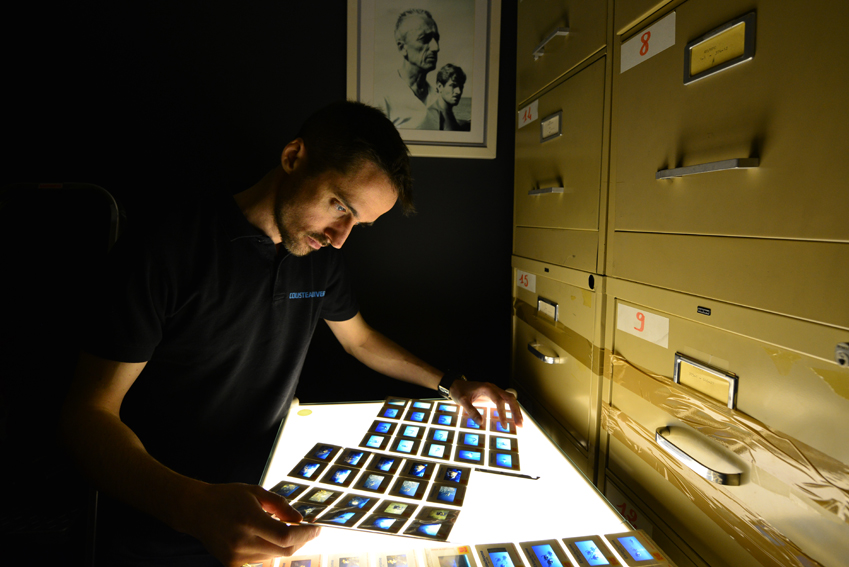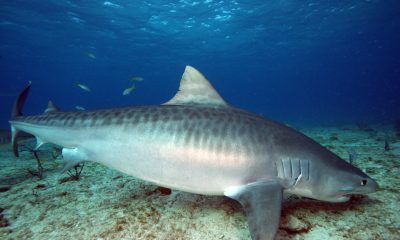Marine Life & Conservation
Pierre-Yves Cousteau’s Journey to Galapagos

The Galapagos… the word itself is enough to inspire awe and make you think of an iguana. Far from the agitations of society, smack on the equator, these islands have always hosted incredibly rich and diverse marine life. It’s also home to the only penguins of the northern hemisphere. It’s awesome.
People come from all over the world to visit its islands and see its birds, to feel its terrestrial wilderness and contemplate its history. Little do they know… the incredibly lush and diverse marine life that lies just beneath the surface of its waters. People who don’t dive are missing out on 75% of the planet! Do it.
I tied up the loose ends at my job as marine program officer at IUCN and set up the out-of-office reply with a smile… I love my work there, it’s stimulating and useful. But sometimes it’s good to be reminded of why you do what you do. Equipment is tested, bags are packed. Soon I’ll be flying across the world to one of this planet’s last sanctuaries of marine life, and birthplace of evolutionary biology. The Galapagos… I’ll be there for three full weeks, two of which will be at sea.
This is my second trip to the Galapagos with Waterproof Expeditions. During the first expedition, in 2012, I was shooting pics and video for Cousteau Divers and engaging the divers on-board to collect their observations with our citizen-science divelogs, developed with the help of Dr. Rebecca Klaus. This time, I will be adding the protocols of Project Hermes, a new feature of Cousteau Divers I launched in 2015, with the help of over a hundred donors, to reveal the temperature of the ocean using dive computers.

This year though, it’s El-Niño… and that usually spells trouble for the marine life of these islands. This cyclical weather event happens every several years and is characterised by an increase in sea temperatures and reduction of marine currents that bring nutrients to the surface, impairing the primary production of algae. But scientists are saying this one could be the strongest ever seen. Previous such events have been known to devastate marine life and the animals that depend on it like penguins and iguanas.
Will we witness the difference between 2012 and today’s El-Niño-menaced Galapagos? Will the citizen-science protocols deployed at the time and during this trip by Cousteau Divers help better understand the phenomenon? Will hungry sharks be more curious than usual? I can’t wait to find out. In the context of climate change and generally warming ocean temperatures, something as normal as El-Niño could take unprecedented proportion.
My father and his teams filmed the marine life of the Galapagos in 1971. A few days ago, I dove into the Cousteau archives in search for photos of the expedition to help reveal the difference, the impact that the powerful El-Niño events of 1982 and 1997 had on the marine life. I did not find anything conclusive, but I will resume my research when I return, armed with new images from the trip.

Diving into the Cousteau archives.
On this trip I will be shooting photos and videos using my friend and mentor Manu San Felix’s D800 and Hugyfot housing as well as a ridiculously useful GoPro (I can’t imagine what my father would have done if those had been around in his day). For lighting I have two small but efficient strobes and two incredibly powerful Big Blue lights (15k lumens each). For Project Hermes, we will be uploading temperatures from our dive computers, testing the Divemate Fusion for mobile integration and deploying a Sensus Ultra, which is a good calibration instrument, given the error margins of dive computers. We will also be using the same divelog methods we used in 2012. I’ve brought along a very small and cheap drone for areal filming… yes I know there is a 92% probability that I will crash it, but I might get some good footage beforehand.
My friend Steve Romano is joining the first week. He does amazing super high-speed video and hopes to catch some diving birds in action. He said something about bringing along a Virtual Reality camera too… more on that in the next post. I’ve also heard that the president of Ecuador is planning to declare a new status for the Galapagos marine sanctuary… which could be signed next week? I’ve learned quite a bit about the challenges of setting these up from my job at IUCN and my work in Santorini, Greece. Let’s see.
I know we’re in for a treat. And I count on the uncertainty that characterises exploration to amaze us and reveal new mysteries of the sea. In the heart of the ocean I find new energy, new hope, new awe. I feel at home beneath the surface, more than anywhere, and I look forward to taking you on a guided tour.
www.waterproof-expeditions.com
For more blogs from Pierre-Yves Cousteau, visit cousteaudivers.wordpress.com.
Marine Life & Conservation
Leading UK-based shark conservation charity, the Shark Trust, is delighted to announce tour operator Diverse Travel as a Corporate Patron

 Corporate Patrons provide a valuable boost to the work of The Shark Trust. The Trust team works globally to safeguard the future of sharks, and their close cousins, the skates and rays, engaging with a global network of scientists, policymakers, conservation professionals, businesses and supporters to further shark conservation.
Corporate Patrons provide a valuable boost to the work of The Shark Trust. The Trust team works globally to safeguard the future of sharks, and their close cousins, the skates and rays, engaging with a global network of scientists, policymakers, conservation professionals, businesses and supporters to further shark conservation.
Specialist tour operator Diverse Travel has operated since 2014 and is committed to offering its guests high quality, sustainable scuba diving holidays worldwide. Working together with the Shark Trust will enable both organisations to widen engagement and encourage divers and snorkellers to actively get involved in shark conservation.
“Sharks are truly at the heart of every diver and at Diverse Travel, we absolutely share that passion. There is nothing like seeing a shark in the wild – it’s a moment that stays with you forever!” says Holly Bredin, Sales & Marketing Manager, Diverse Travel.
“We’re delighted to celebrate our 10th year of business by becoming a Corporate Patron of the Shark Trust. This is an exciting partnership for Diverse and our guests. We will be donating on behalf of every person who books a holiday with us to contribute towards their vital shark conservation initiatives around the world. We will also be working together with the Trust to inspire divers, snorkellers and other travellers to take an active role – at home and abroad – in citizen science projects and other activities.”
Paul Cox, CEO of The Shark Trust, said:
“It’s an exciting partnership and we’re thrilled to be working with Diverse Travel to enable more divers and travellers to get involved with sharks and shark conservation. Sharks face considerable conservation challenges but, through collaboration and collective action, we can secure a brighter future for sharks and their ocean home. This new partnership takes us one more valuable step towards that goal.”
For more information about the Shark Trust visit their website here.
For more about Diverse Travel click here.
Marine Life & Conservation
Shark Trust Asks Divers to help with Shark Sightings this Global Citizen Science Month

 Whether you are stuck for ideas of what to do with the kids or are off on the dive trip of your dreams. You can get involved in Citizen Science Month and help the Shark Trust by providing vital data about sharks are rays both close to home and further afield.
Whether you are stuck for ideas of what to do with the kids or are off on the dive trip of your dreams. You can get involved in Citizen Science Month and help the Shark Trust by providing vital data about sharks are rays both close to home and further afield.
In addition to reporting the sharks and rays you see on your dives, the eggcases you find on the beach, the Shark Trust is looking for some specific data from divers who are asked to report any Oceanic Whitetip and Basking Sharks.
Oceanic Whitetip Sharks
The Shark Trust are looking specifically for Oceanic Whitetip Shark sightings over the coming weeks and months. So, if you are diving anywhere in the world, please report your sightings via the website or app.
Website: https://recording.sharktrust.org/
App: Search The Shark Trust in your app store
The Oceanic Whitetip. Known for their incredibly long dorsal and pectoral fins, this species was once the most abundant oceanic-pelagic species of shark on the planet.
Large and stocky, they are grey or brown above, and white below and famous for their huge rounded first dorsal fin and paddle-like pectoral fins. The fins also highly prized within the shark fin trade. Whilst they are mostly solitary, Oceanic Whitetips do occasionally hunt in groups.
An inquisitive species, they were easy prey for fisheries. Combined with their low reproductive rate, they were inevitably at high risk of population depletion. And declines of up to 99% have been reported in certain sea areas. They are listed as Critically Endangered on the IUCN Redlist (2019).
Conservation efforts to discourage further declines include listing on CITES Appendix II and CMS Appendix I. They’re also the only species prohibited from take by all the Tuna RFMOs (Regional Fisheries Management Organisations). However, these measures do not mean that Oceanic Whitetips are not still caught – whether targeted or as bycatch – in some parts of the world. With populations declining at such a high rate, effective implementation of management measures is essential to ensure that the species can recover.
If you are lucky enough to get an image of an Oceanic Whitetip and you record your sighting on the Shark Trust app or website YOU CAN WIN! All images submitted with sightings, that also give consent to use in conservation messaging, will be in with a chance to win an Oceanic Whitetip T-shirt and mug. The competition will run until the end of “Shark Month” in July – so keep those sightings (and images) coming in.
Basking Sharks
Basking Shark (Cetorhinus maximus) season is upon us, and the Shark Trust is asking everyone to keep an eye out for these majestic giants over the summer months. If you see any, you can record your sighting to the Basking Shark Sightings database.
Each year, these mighty fish return to British waters to feed on plankton. You may see one, (or a few if you’re really lucky) from around April-October. They can be seen feeding at the surface of the water, where they look like they’re basking in the sun. Thus, their name!
Sighting hotspots around the British Isles include southwest England, Isle of Man, north coast of Ireland, and western Scotland. The Sea of the Hebrides is the most prolific sightings area in Scotland, but they have been spotted all around the coast and have even ventured into some of the sea lochs. The Shark Trust has received thousands of sightings since the Basking Shark project began, but more data is needed to truly understand what is going on with population numbers and distribution. You can help by recording your sightings this summer.
Great Eggcase Hunt
The Shark Trust has an Easter Egg Hunt with a difference for you to try. Take part in the Great Eggcase Hunt and get involved with a big citizen science project that helps shark, ray and skate conservation. And it’s an enjoyable activity for all the family.
The Shark Trust also want snorkellers and divers to record their underwater eggcase findings. Underwater records help pinpoint exactly where sharks and skates are laying their eggs and can help link to beach records. Learning the depth and substrate that they lay on also helps better understand the species.
Find out more: https://www.sharktrust.org/great-eggcase-hunt
Whether you are diving, snorkelling or exploring on the beach you can take part in Citizen Science Month and get actively involved in shark and ray conservation. Find out more: www.sharktrust.org
-

 News3 months ago
News3 months agoHone your underwater photography skills with Alphamarine Photography at Red Sea Diving Safari in March
-

 News2 months ago
News2 months agoCapturing Critters in Lembeh Underwater Photography Workshop 2024: Event Roundup
-

 Marine Life & Conservation Blogs2 months ago
Marine Life & Conservation Blogs2 months agoCreature Feature: Swell Sharks
-

 Blogs1 month ago
Blogs1 month agoMurex Resorts: Passport to Paradise!
-

 Gear News3 months ago
Gear News3 months agoBare X-Mission Drysuit: Ideal for Both Technical and Recreational Divers
-

 Blogs2 months ago
Blogs2 months agoDiver Discovering Whale Skeletons Beneath Ice Judged World’s Best Underwater Photograph
-

 Gear Reviews2 months ago
Gear Reviews2 months agoGear Review: Oceanic+ Dive Housing for iPhone
-

 Blogs3 months ago
Blogs3 months agoThe Thrilling Encounter with Tiger Sharks at Beqa Lagoon’s ‘The Colosseum’ with Coral Coast Divers









